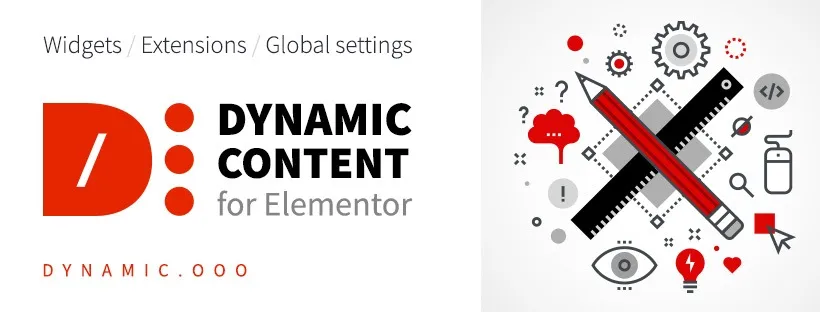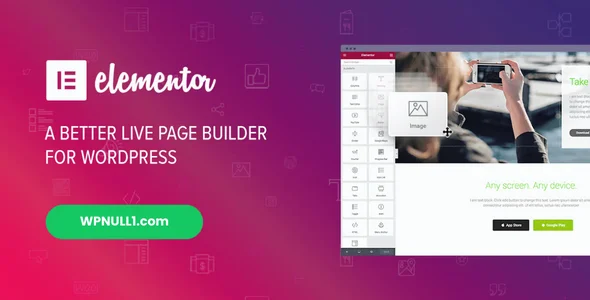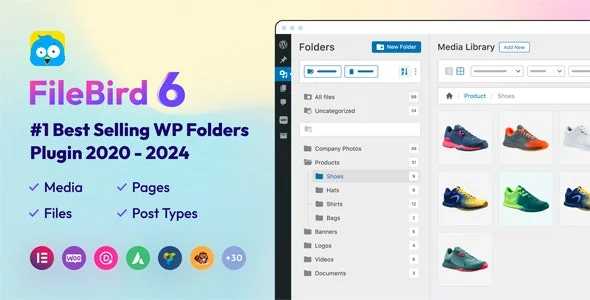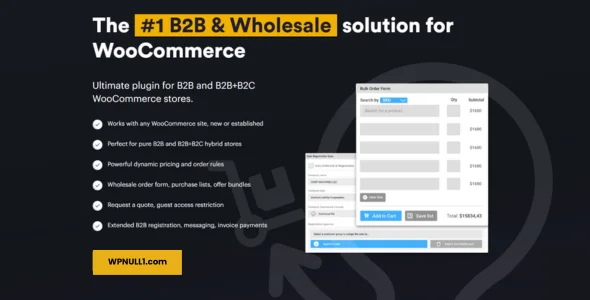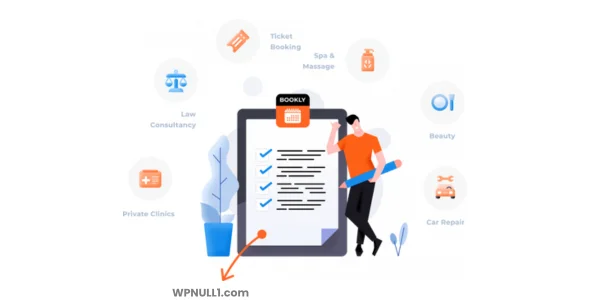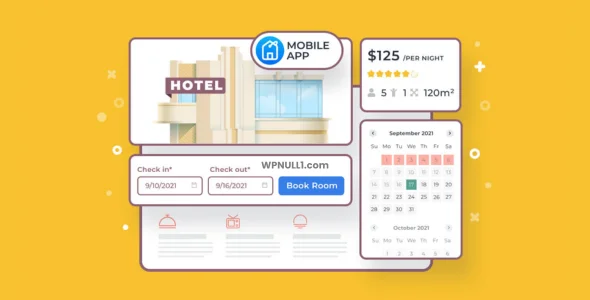Dynamic Content for Elementor Free Download is a premium plugin designed to extend the capabilities of the Elementor page builder. While Elementor itself is already a powerful tool, this plugin allows you to take your website to the next level by adding advanced dynamic features that aren’t available in the basic Elementor setup. Whether you’re a web designer, developer, or a business owner looking to create a highly customized and interactive website, Dynamic Content for Elementor provides the tools you need to stand out.
Main Body
Enhanced Interactivity with Dynamic Content
Dynamic Content for Elementor is designed to make your WordPress site more interactive and user-friendly. It provides several features that allow you to display content dynamically based on user interaction or other variables.
- Dynamic Post and User Data: With Dynamic Content for Elementor, you can easily display dynamic post content, user data, and custom fields on your website. This is especially useful for sites that need to display personalized content, such as membership sites, eCommerce platforms, or blogs with user-specific content.
- Conditional Display: This feature allows you to show or hide elements based on specific conditions. For instance, you can display different content to logged-in users versus visitors or show certain elements only when specific conditions are met. This ensures that your site is always relevant and engaging to each user.
- Advanced Forms Integration: The plugin also integrates seamlessly with Elementor’s form builder, allowing you to create advanced, dynamic forms that can capture and display data in real-time. This is perfect for creating interactive forms, quizzes, or surveys that respond to user input dynamically.
Customization Beyond the Basics
Dynamic Content for Elementor offers extensive customization options that allow you to tailor your site exactly to your needs.
- Custom Loops and Grids: With this feature, you can create custom loops and grids that display posts, products, or any custom post types in a highly customizable format. This is particularly useful for eCommerce sites or portfolios where you need to present content in a visually appealing way.
- Dynamic Templates: The plugin allows you to create dynamic templates that can be used across your site. This means you can design a template once and use it for multiple pages or posts, with the content dynamically updating based on the context. This not only saves time but also ensures consistency across your site.
- Dynamic Visibility: Similar to conditional display, dynamic visibility allows you to control the visibility of Elementor widgets and sections based on conditions like user roles, dates, or device types. This is perfect for creating time-sensitive offers, member-only content, or mobile-specific sections.
Integration and Compatibility
One of the strengths of Dynamic Content for Elementor is its compatibility with other WordPress plugins and tools.
- Seamless Integration with ACF and WooCommerce: The plugin integrates seamlessly with Advanced Custom Fields (ACF) and WooCommerce, allowing you to display custom fields and product data dynamically. This makes it ideal for complex websites that rely heavily on custom data or eCommerce functionality.
- Third-Party Plugins Support: Dynamic Content for Elementor is compatible with various third-party plugins, ensuring that it works well within your existing WordPress ecosystem. Whether you’re using SEO tools, caching plugins, or security solutions, Dynamic Content for Elementor is designed to play nicely with others.
- Ongoing Updates and Support: The team behind Dynamic Content for Elementor provides regular updates and comprehensive support to ensure that the plugin continues to evolve with the needs of its users. This means you can count on new features and improvements over time.
Who is it Ideal For?
Dynamic Content for Elementor is ideal for:
- Web Designers and Developers: Professionals who build websites for clients will appreciate the advanced customization and dynamic features that this plugin offers. It allows for creating unique, highly tailored websites that go beyond standard Elementor capabilities.
- eCommerce Website Owners: If you run an online store, Dynamic Content for Elementor can help you create personalized shopping experiences, dynamic product displays, and interactive elements that enhance user engagement and conversion rates.
- Content Creators and Bloggers: Bloggers and content creators who want to present their content in a dynamic and engaging way will find this plugin extremely useful. It enables the creation of custom post loops, dynamic templates, and personalized content displays.
- Membership Sites: For websites that offer membership or subscription services, Dynamic Content for Elementor is perfect for managing user-specific content, displaying custom data, and creating a personalized user experience.
Pros and Cons
Pros
- Extensive Dynamic Features: The plugin offers a wide range of dynamic features that enhance the interactivity and customization of your website.
- Seamless Integration with Popular Plugins: Works well with ACF, WooCommerce, and other popular WordPress plugins, making it versatile for various site types.
- Regular Updates and Support: The plugin is actively maintained, ensuring compatibility with the latest WordPress and Elementor updates.
- Advanced Conditional Logic: Provides powerful tools for controlling the visibility and display of content based on specific conditions.
Cons
- Learning Curve: Due to its advanced features, there is a learning curve, especially for beginners who are not familiar with dynamic content.
- Additional Costs: While the plugin adds significant value, it does come at an additional cost, which might be a consideration for budget-conscious users.
- Overwhelming for Simple Sites: For basic websites, the extensive features may be more than what is needed, potentially leading to overcomplication.
Comparison with Alternatives
When compared to other plugins that offer similar functionality, Dynamic Content for Elementor stands out in several ways:
- Crocoblock JetEngine
- Pros: JetEngine offers a comprehensive suite of tools for dynamic content creation, including custom post types, taxonomies, and listings. It is very versatile and integrates well with Elementor.
- Cons: It can be complex to set up and might be overkill for users who only need basic dynamic features.
- Elementor Pro
- Pros: As the official premium version of Elementor, it includes many dynamic content features, such as theme builder, WooCommerce builder, and dynamic tags.
- Cons: While powerful, Elementor Pro’s dynamic features are not as extensive or specialized as those offered by Dynamic Content for Elementor.
- Toolset
- Pros: Toolset is known for its ability to create custom post types, fields, and taxonomies, with strong support for dynamic content and custom views.
- Cons: It has a steeper learning curve and is more geared towards developers, making it less user-friendly for beginners.
- ACF (Advanced Custom Fields)
- Pros: ACF is a powerful tool for adding custom fields and data to WordPress, which can be displayed dynamically with Elementor.
- Cons: ACF alone does not provide front-end display options, so it requires additional tools or coding to achieve the same results as Dynamic Content for Elementor.
Dynamic Content for Elementor Nulled is a game-changer for anyone looking to create highly interactive, customized, and dynamic WordPress websites. With its extensive feature set, seamless integrations, and robust support, it offers everything you need to elevate your Elementor-powered site to the next level. While it comes with a learning curve, the investment in time and cost is well worth it for those who need advanced dynamic content capabilities.
Whether you’re a web designer, eCommerce site owner, or content creator, Dynamic Content for Elementor provides the tools necessary to create a unique and engaging online experience. When compared to other dynamic content solutions, it stands out for its ease of use, integration capabilities, and the breadth of features it offers, making it a top choice for anyone serious about building a professional WordPress site.
Changelog
v3.1.2 – 2024/10/22
* Fix: Dynamic OpenStreetMap, JS errors in some situations
v3.1.1 – 2024/10/21
* Fix: Missing some zip data in previous release, causing some style and JS issues
v3.1.0 – 2024/10/21
* New: Remote Content renamed, now called Dynamic API for JSON data and Web Scraper for web content
* New: Lazy iFrame widget
* Tweak: Add to Favorites now automatically refreshes the Favorites widget when items are added or removed
* Tweak: Dynamic Charts, added the ability to insert text after values when they are entered from a CSV
* Notice: PDF Generator for Elementor Pro Form: from the next version the SVG converter will be considered deprecated (but it won’t be removed). You can use the HTML converter for new PDFs.
* Fix: PDF Generator for Elementor Pro Form, sanitize file names to avoid failures on save
* Fix: ACF Repeater widget should not show previous slides when using fade effect in carousel
* Fix: Dynamic Posts, ACF Repeater, ACF Slider, Views Widgets, Carousel didn’t work correctly in editor mode, causing a crash in some cases
* Fix: Formatted Number Field for Elementor Pro Form, many Form styles were not applied to it
* Fix: Views accordion not working correctly in some cases after Elementor 3.24 update
* Minor fixes
v3.0.12 – 2024/08/21
* Tweak: Dynamic Email for Elementor Pro Form, add filter dynamicooo/dynamic-email/attachments
* Tweak: Swiper compatibility for carousels on Elementor 2.24
* Tweak: migrated scroll triggers from waypoint.js to IntersectionObserver
* Fix: ACF Frontend Form widget was not working in some cases
* Fix: Dynamic Post widget, grid layout with masonry, sometimes the items would overlap on first load
* Fix: Form Dynamic Shortcodes did not work inside the Dynamic Tag Shortcode in some cases
* Fix: PHP HTML templates, missing font file error in some cases
* Minor fixes
